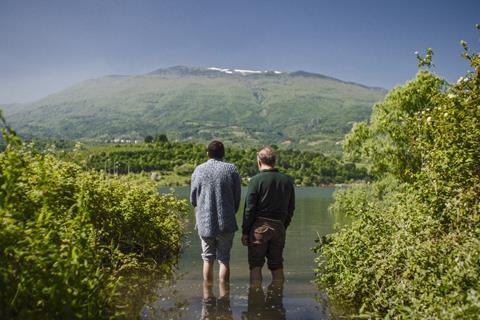The third feature from Ali Vatansever makes its debut in Tallinn Black Nights

Dir/scr: Ali Vatansever. Turkey/Greece/Romania. 2025. 115mins
Nineteen-year-old Izzet (Onur Gozeten) escapes from his terminal cancer diagnosis and the concrete walls of his parents’ Istanbul flat through his VR headset. His mother, Reyhan (Esra Kızıldogan), goes to war with the disease as a cancer-fighting social media influencer with a fanbase and over 50,000 followers. And his father, school bus driver Abdi (Fatih Al), retreats into himself before reaching out to religion for solace. Shot partly within a virtual realm created in VRChat, LifeLike is an inventive, if slightly uneven, attempt to answer an impossible question: should a parent support their child unconditionally, even if they wish to end their life?
The film’s most distinctive element is the use of VR material
This is the third feature from immersive VR creator Ali Vatansever, who also teaches film production and VR at Koc University in Istanbul. His debut was 2012’s One Day Or Another; his second feature, Saf (2018), premiered at Toronto. LifeLike was inspired by the first euthaniasia court case in modern Turkey, of a father under trial for ending his terminally ill son’s life. The film’s most distinctive element however, is not the taboo subject of assisted suicide but the use of VR material.
In this, the picture will draw inevitable comparisons with the documentary The Remarkable Life Of Ibelin, which posthumously explored the role of virtual worlds in broadening the horizons of a disabled young adult. But despite the distressing subject matter and generally strong performances, LifeLike’s use of VR is a distancing device and the picture fails to match the considerable emotional impact or the insights of Ibelin. That said, the film’s ground-breaking incorporation of VR material will likely be a talking point at further festivals following its Tallinn premiere, and may be a selling point for adventurous distributors.
There are few feelings, the film argues, more devastating for a parent than being powerless to make things right for their child. Reyhan’s internet rabbit-hole quest for a miracle may seem illogical, but desperation can make a mother clutch at the most unpromising straws. We first meet Reyhan urging her husband to decapitate a tortoise in order to harvest a shot glass full of its blood. But Reyhan soon becomes fixated on a miraculous plant which grows in the Anatolian mountains and allegedly cures everything, cancer included.
Abdi, meanwhile, feels ashamed by his failure to help his son. For the first part of the film we hardly see the face that he hides from the world – he is shot in silhouette or in profile, shoulders bowed under the weight of his grief. His spiritual quest leads him to seek counsel from the local Islamic Hodja.
While his parents look for answers, Izzet just longs for release. In VRChat, he dances, flirts and fights like any other kid his age – rather than use the technology for extravagant fantasies, Izzet wants to recreate what he’s missing. He creates a customised world with a view to die for – a lake, mountains and boundless horizons in a throbbing, super-saturated colour palette, a contrast to the boxy, joyless balconies that he can see from his sickbed. Compared to this, the real world can be a disappointment, as Izzet painfully discovers when he invites his VR girlfriend to meet him at his parents’ flat, an awkward and abortive encounter.
Izzet’s suicide attempt – he covers himself with morphine patches – changes something in Abdi, whose character arc is the main spine of the film. In anguish, he calls an Islamic advice line to ask if helping his child to die would be considered haram. But then he decides to take matters into his own hands, converting his school bus into a mobile bed with a view and driving to the mountains.
There’s a tacit understanding between father and son, something that Vatansever illustrates by gradually blurring the boundaries between the real world and the VR realm as the journey progresses. Meanwhile, Reyhan, unmoored and alone in the apartment, grieves both for her son and for the precarious social media cachet that depends on his survival.
Production companies: Terminal Film, Aktan Görsel Sanatlar, Foss Productions, Da Clique
Contact: Terminal Film info@terminal.tr
Producers: Selin Vatansever Tezcan, Oya Ozden Ozdemir, Aytun Aktan Bahceci, Antigoni Rota, Stelios Cotionis, Alexandru Dumitru
Cinematography: Konstantinos Koukoulios
Editing: Evren Lus, Feyza Kayikcik
Production design: Meral Efe Yurtseven, Emre Yurtseven
Music: Erdem Helvacioglu
Main cast: Fatih Al, Esra Kızıldogan, Onur Gozeten















![[L-R]: Amanda Villavieja, Laia Casanovas, Yasmina Praderas](https://d1nslcd7m2225b.cloudfront.net/Pictures/274x183/6/4/1/1471641_pxl_20251224_103354743_618426_crop.jpg)








